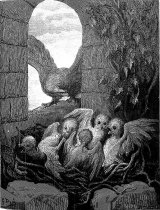The Eagle and the Owl
"The Eagle and the Owl" is a fable by Jean de La Fontaine that is part of his collection of tales. This story portrays the unlikely friendship between an eagle and an owl, emphasizing the themes of unlikely alliances, cynicism, tolerance, and understanding. Each character's traits are deeply explored, with the mighty eagle representing nobility and strength, while the owl symbolizes wisdom and vigilance.
The Eagle and the Owl had treaty made-- Ceased quarrelling, and even had embraced. One took his royal oath; and, undismayed, The other's claw upon his heart was placed: Neither would gulp a fledgling of the other. "Do you know mine?" Minerva's wise bird said. The Eagle gravely shook her stately head, "So much the worse," the Owl replied. "A mother Trembles for her sweet chicks--she does, indeed. It's ten to one if I can rear them then. You are a king, and, therefore, take no heed Of who or what. The gods and lords of men Put all things on one level: let who will Say what they like. Adieu, my children dear, If you once meet them." "Nay, good ma'am, but still, Describe them," said the Eagle; "have no fear: Be sure I will not touch them, on my word." The Owl replied, "My little ones are small, Beautiful, shapely,--prettier, far, than all. By my description you will know the dears; Do not forget it: let no fate by you Find way to us, and cause me ceaseless tears." Well, one fine evening, the old Owl away, The Eagle saw, upon a rocky shelf, Or in a ruin, (who cares which I say?) Some little ugly creatures. To himself The Eagle reasoned, "These are not our friend's, Moping and gruff, and such a screeching, too: Let's eat 'em." Waste time never spends The royal bird, to give the brute his due; And when he eats, he eats, to tell the truth. The Owl, returning, only found the feet Of her dear offspring:--sad, but yet it's sooth. She mourns the children, young, and dear, and sweet, And prays the gods to smite the wicked thief, That brought her all the woe and misery. Then some one said, "Restrain thy unjust grief; Reflect one moment on the casualty. Thou art to blame, and also Nature's law, Which makes us always think our own the best. You sketched them to the Eagle as you saw: They were not like your portrait;--am I just?"
Translation
Translate and read this book in other languages:
Select another language:
- - Select -
- 简体中文 (Chinese - Simplified)
- 繁體中文 (Chinese - Traditional)
- Español (Spanish)
- Esperanto (Esperanto)
- 日本語 (Japanese)
- Português (Portuguese)
- Deutsch (German)
- العربية (Arabic)
- Français (French)
- Русский (Russian)
- ಕನ್ನಡ (Kannada)
- 한국어 (Korean)
- עברית (Hebrew)
- Gaeilge (Irish)
- Українська (Ukrainian)
- اردو (Urdu)
- Magyar (Hungarian)
- मानक हिन्दी (Hindi)
- Indonesia (Indonesian)
- Italiano (Italian)
- தமிழ் (Tamil)
- Türkçe (Turkish)
- తెలుగు (Telugu)
- ภาษาไทย (Thai)
- Tiếng Việt (Vietnamese)
- Čeština (Czech)
- Polski (Polish)
- Bahasa Indonesia (Indonesian)
- Românește (Romanian)
- Nederlands (Dutch)
- Ελληνικά (Greek)
- Latinum (Latin)
- Svenska (Swedish)
- Dansk (Danish)
- Suomi (Finnish)
- فارسی (Persian)
- ייִדיש (Yiddish)
- հայերեն (Armenian)
- Norsk (Norwegian)
- English (English)
Citation
Use the citation below to add this book to your bibliography:
Style:MLAChicagoAPA
"The Eagle and the Owl Books." Literature.com. STANDS4 LLC, 2025. Web. 22 Feb. 2025. <https://www.literature.com/book/the_eagle_and_the_owl_2564>.








Discuss this The Eagle and the Owl book with the community:
Report Comment
We're doing our best to make sure our content is useful, accurate and safe.
If by any chance you spot an inappropriate comment while navigating through our website please use this form to let us know, and we'll take care of it shortly.
Attachment
You need to be logged in to favorite.
Log In